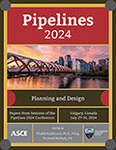Leak Detection and Localization in Water Networks Using Convolutional Neural Networks with a Modified Loss Function
Publication: Pipelines 2024
ABSTRACT
Leaks in water distribution networks can cause considerable water wastage, infrastructure damage, and contamination. Various solutions have been developed for leak detection. Previous researchers have applied deep learning, utilizing traditional loss functions, such as F1 score or accuracy. However, these approaches may oversimplify the real challenge of quickly repairing leaks. This study aims to develop a Convolutional Neural Network (CNN) for leak detection, trained with the specific objective of optimizing leak detection. A synthetic data set is developed by simulating leaks using EPANET in Python. The leakage detection model was trained with a modified loss function based on the distance to the actual leak. Results show that the use of the modified loss function led to better leak detection accuracy than with the traditional loss function. These findings provide insights into strategies for using novel deep-learning models to efficiently detect leaks.
Get full access to this chapter
View all available purchase options and get full access to this chapter.
REFERENCES
Abdulshaheed, A., Mustapha, F., and Ghavamian, A. (2017). “A pressure-based method for monitoring leaks in a pipe distribution system: A Review.” Renewable and Sustainable Energy Reviews, 69: 902–911. Elsevier.
Adedeji, K. B., Hamam, Y., Abe, B. T., and Abu-Mahfouz, A. M. (2017). Towards achieving a reliable leakage detection and localization algorithm for application in water piping networks: An overview. IEEE Access, 5, 20272–20285.
AWWA (American Water Works Association). (2017). Computer Modeling of Water Distribution Systems - Manual of Water Supply Practices, M32 (4th Edition). American Water Works Association (AWWA).
Bakker, M., Trietsch, E. A., Vreeburg, J. H. G., and Rietveld, L. C. (2014). Analysis of historic bursts and burst detection in water supply areas of different size. Water Science and Technology: Water Supply, 14(6), 1035–1044.
Barton, N. A., Farewell, T. S., Hallett, S. H., and Acland, T. F. (2019). Improving pipe failure predictions: Factors affecting pipe failure in drinking water networks. Water research, 164, 114926.
Beuken, R. H. S., Lavooij, C. S. W., Bosch, A., and Schaap, P. G. (2008). Low leakage in the Netherlands confirmed. In Water Distribution Systems Analysis Symposium 2006 (pp. 1–8).
Cody, R. A., Dey, P., and Narasimhan, S. (2020). Linear prediction for leak detection in water distribution networks. Journal of Pipeline Systems Engineering and Practice, 11(1), 04019043.
Fanner, P., Davis, S., Hoogerwerf, T., Liemberger, R., Sturm, R., and Thornton, J. (2008). Leakage management technologies. Water Environment Research Foundation.
Geelen, C. V., Yntema, D. R., Molenaar, J., and Keesman, K. J. (2019). Monitoring support for water distribution systems based on pressure sensor data. Water Resources Management, 33, 3339–3353.
Goulet, J. A., and Smith, I. F. (2013). Structural identification with systematic errors and unknown uncertainty dependencies. Computers & structures, 128, 251–258.
Hajibandeh, E., and Nazif, S. (2018). Pressure zoning approach for leak detection in water distribution systems based on a multi objective ant colony optimization. Water resources management, 32, 2287–2300.
Hope, W. (1892). The waste of water in public supplies, and its prevention.(including appendix). In Minutes of the Proceedings of the Institution of Civil Engineers (Vol. 110, No. 1892, pp. 260–275). Thomas Telford-ICE Virtual Library.
Hu, Z., Chen, B., Chen, W., Tan, D., and Shen, D. (2021). Review of model-based and data-driven approaches for leak detection and location in water distribution systems. Water Supply, 21(7), 3282–3306.
Hunaidi, O., Wang, A., Bracken, M., Gambino, T., and Fricke, C. (2004, May). Acoustic methods for locating leaks in municipal water pipe networks. In International conference on water demand management (pp. 1–14). Jordan: Dead Sea.
Levinas, D., Perelman, G., and Ostfeld, A. (2021). Water leak localization using high-resolution pressure sensors. Water, 13(5), 591.
Loureiro, D., Amado, C., Martins, A., Vitorino, D., Mamade, A., and Coelho, S. T. (2016). Water distribution systems flow monitoring and anomalous event detection: A practical approach. Urban Water Journal, 13(3), 242–252.
Mounce, S. R., Day, A. J., Wood, A. S., Khan, A., Widdop, P. D., and Machell, J. (2002). A neural network approach to burst detection. Water science and technology, 45(4-5), 237–246.
Mounce, S. R., Mounce, R. B., and Boxall, J. B. (2011). Novelty detection for time series data analysis in water distribution systems using support vector machines. Journal of hydroinformatics, 13(4), 672–686.
Pérez, R., Puig, V., Pascual, J., Quevedo, J., Landeros, E., and Peralta, A. (2011). Methodology for leakage isolation using pressure sensitivity analysis in water distribution networks. Control Engineering Practice, 19(10), 1157–1167.
Puust, R., Kapelan, Z., Savic, D. A., and Koppel, T. (2010). A review of methods for leakage management in pipe networks. Urban Water Journal, 7(1), 25–45.
Qi, Z., Zheng, F., Guo, D., Zhang, T., Shao, Y., Yu, T., and Maier, H. R. (2018). A comprehensive framework to evaluate hydraulic and water quality impacts of pipe breaks on water distribution systems. Water Resources Research, 54(10), 8174–8195.
Romano, M., Kapelan, Z., and Savić, D. A. (2014). Automated detection of pipe bursts and other events in water distribution systems. Journal of Water Resources Planning and Management, 140(4), 457–467.
Wan, X., Kuhanestani, P. K., Farmani, R., and Keedwell, E. (2022). Literature review of data analytics for leak detection in water distribution networks: A focus on pressure and flow smart sensors. Journal of Water Resources Planning and Management, 148(10), 03122002.
Wang, X., Guo, G., Liu, S., Wu, Y., Xu, X., and Smith, K. (2020). Burst detection in district metering areas using deep learning method. Journal of Water Resources Planning and Management, 146(6), 04020031.
Zaman, D., Tiwari, M. K., Gupta, A. K., and Sen, D. (2020). A review of leakage detection strategies for pressurised pipeline in steady-state. Engineering Failure Analysis, 109, 104264.
Information & Authors
Information
Published In
History
Published online: Aug 30, 2024
Authors
Metrics & Citations
Metrics
Citations
Download citation
If you have the appropriate software installed, you can download article citation data to the citation manager of your choice. Simply select your manager software from the list below and click Download.
